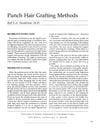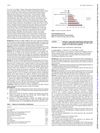 1 citations,
January 2017 in “Springer eBooks”
1 citations,
January 2017 in “Springer eBooks” Hair follicles are important for drug delivery through the skin, but better methods are needed to understand and improve this process.
 1 citations,
February 2009 in “Journal of Investigative Dermatology”
1 citations,
February 2009 in “Journal of Investigative Dermatology” VEGF helps squamous cell carcinoma grow in ways beyond just blood vessel formation.
 1 citations,
November 2002 in “Neurosurgery Clinics of North America”
1 citations,
November 2002 in “Neurosurgery Clinics of North America” The article concludes that cranial reconstruction should aim for the best aesthetic result, using various techniques tailored to individual needs and conditions.
 1 citations,
February 1999 in “Journal of Paediatrics and Child Health”
1 citations,
February 1999 in “Journal of Paediatrics and Child Health” The document concludes that each reviewed medical book is useful for its specific area in pediatric care, especially the "Neonatal Formulary" for neonatal drug information.
 1 citations,
April 1995 in “Annals of Plastic Surgery”
1 citations,
April 1995 in “Annals of Plastic Surgery” The Mercedes incision is a new hair restoration technique that creates a more natural look and has a high success rate.
 1 citations,
January 1985 in “Facial Plastic Surgery”
1 citations,
January 1985 in “Facial Plastic Surgery” The document recommends careful planning and techniques for successful punch hair grafting in hair restoration.
 December 2024 in “International Journal of Drug Delivery Technology”
December 2024 in “International Journal of Drug Delivery Technology” The new delivery method for dutasteride is more effective and has fewer side effects.

New treatments for skin conditions show promise, especially Coacillium® for hair growth in young people with alopecia areata.

The method creates realistic, anonymous acne face images for research, achieving 97.6% accuracy in classification.
 April 2024 in “International Journal of Research Publication and Reviews”
April 2024 in “International Journal of Research Publication and Reviews” Alopecia areata causes hair loss with varied treatment responses and frequent relapses.
 April 2024 in “International Research Journal Of Modernization In Engineering Technology And Science”
April 2024 in “International Research Journal Of Modernization In Engineering Technology And Science” Herbal shampoos are effective, non-toxic alternatives for treating dandruff and hair fall.
 March 2024 in “medRxiv (Cold Spring Harbor Laboratory)”
March 2024 in “medRxiv (Cold Spring Harbor Laboratory)” Recent selection on immune response genes was identified across seven ethnicities.
 February 2024 in “Bangladesh pharmaceutical journal”
February 2024 in “Bangladesh pharmaceutical journal” The conclusion is that the tested yogurts from Bangladesh are rich in vitamins thiamine and riboflavin, and the testing method is reliable.
 January 2024 in “Journal of applied biological chemistry”
January 2024 in “Journal of applied biological chemistry” Glehnia littoralis and Andrographis paniculata extracts can significantly boost hair growth.
 January 2024 in “American journal of clinical dermatology”
January 2024 in “American journal of clinical dermatology” Ritlecitinib is safe and well-tolerated for treating alopecia areata in patients aged 12 and older.
 January 2024 in “Journal of cellular immunology”
January 2024 in “Journal of cellular immunology” Hair follicle stem cells are important for maintaining healthy skin and interact with many signals.
 January 2024 in “Wiadomości Lekarskie”
January 2024 in “Wiadomości Lekarskie” Robotic hair transplantation with AI offers more reliable, precise, and efficient hair restoration.
 December 2023 in “Journal of health and rehabilitation research”
December 2023 in “Journal of health and rehabilitation research” Oral Apremilast effectively treats alopecia areata in most patients.
 December 2023 in “Frontiers in oncology”
December 2023 in “Frontiers in oncology” Older ovarian cancer patients live longer and tolerate weekly chemotherapy better than three-weekly treatments.
 November 2023 in “Frontiers in veterinary science”
November 2023 in “Frontiers in veterinary science” The study provides insights into hair growth mechanisms in yaks.
 November 2023 in “bioRxiv (Cold Spring Harbor Laboratory)”
November 2023 in “bioRxiv (Cold Spring Harbor Laboratory)” Scientists made a mouse that shows how a specific protein in the skin changes and affects hair growth and shape.
 October 2023 in “The Journal of clinical endocrinology and metabolism/Journal of clinical endocrinology & metabolism”
October 2023 in “The Journal of clinical endocrinology and metabolism/Journal of clinical endocrinology & metabolism” Hyperandrogenism increases heart disease risk in premenopausal women, but this risk is linked to obesity in postmenopausal women.
 September 2023 in “bioRxiv (Cold Spring Harbor Laboratory)”
September 2023 in “bioRxiv (Cold Spring Harbor Laboratory)” The mTurq2-Col4a1 mouse model shows that cells can divide while attached to stable basement membranes during development.
 July 2023 in “Research Square (Research Square)”
July 2023 in “Research Square (Research Square)” Skin's uneven surface and hair follicles affect its stress and strain but don't change its overall strength, and help prevent the skin from peeling apart.
 July 2023 in “The Egyptian Journal of Hospital Medicine ”
July 2023 in “The Egyptian Journal of Hospital Medicine ” Alopecia areata is a hair loss condition caused by immune factors and can be treated with JAK inhibitors.

Older men with late-onset lupus have a higher mortality rate than women.
 May 2023 in “Journal of Pharmaceutical Research”
May 2023 in “Journal of Pharmaceutical Research” Neem is highly beneficial for health and beauty with no major side effects.
 April 2023 in “Medizinische Genetik”
April 2023 in “Medizinische Genetik” New research has found 14 genes linked to the risk of developing alopecia areata, improving understanding and treatment options.
 January 2023 in “National Journal of Physiology, Pharmacy and Pharmacology”
January 2023 in “National Journal of Physiology, Pharmacy and Pharmacology” Tofacitinib effectively reduced hair loss in alopecia areata patients without adverse effects.
 December 2022 in “bioRxiv (Cold Spring Harbor Laboratory)”
December 2022 in “bioRxiv (Cold Spring Harbor Laboratory)” MicroRNA-205 helps hair grow by changing the stiffness and contraction of hair follicle cells.






























